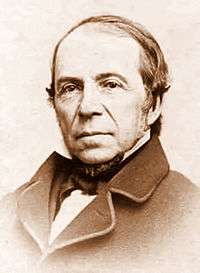Leo Lesquereux
Charles Léo Lesquereux (November 18, 1806 – October 25, 1889) was a Swiss bryologist and a pioneer of American paleobotany. He was born in the town of Fleurier, located in the canton of Neuchâtel.

Career
Despite the fact Lesquereux lacked formal training in botany, he became a celebrated and much published figure in the field of paleobotany. Until 1827 he took classes at the academy at Neuchâtel, and subsequently worked as a tutor of French language in Eisenach, Germany(at the time Prussia). There he tutored many higher-class individuals, including some children of royalty. Afterwards he returned to Switzerland as a schoolteacher, and later principal at the College of La Chaux-de-Fonds. In 1833 he suffered a total loss of hearing due to the maltreatment of a French otologist and resigned his position.
As a young man he took many excursions in order to collect mosses in the Jura Mountains, eventually leading to investigations of peat bogs. His pioneer research and analysis on the origin, composition and development of peat resulted in a close friendship with famed scientist Louis Agassiz (1807–1873). Soon afterwards, Lesquereux was commissioned by the Prussian government to perform scientific studies of peat bogs throughout Europe.
In 1848 Lesquereux followed Agassiz to the United States, subsequently residing in Columbus, Ohio, where he performed bryological research with William Starling Sullivant (1803–1873). With Sullivant, he published two editions of a treatise called Musci Boreali-Americani Quorum Specimina Exsiccata (1856, 1865).
Based on his past studies of European peat bogs, Lesquereux developed theories on the origin of coal formations. As a consultant for state geological surveys in several U.S. states, he performed pioneer investigations of Paleozoic flora. From these paleobotanical studies, his best work was a study of carboniferous flora of Pennsylvania, titled "Atlas to the Coal Flora of Pennsylvania and the Carboniferous Formation throughout the United States" (1879–84), a three-volume publication that became a standard for U.S. carboniferous flora.
The plant genus Lesquerella from the family Brassicaceae and the testate amoeba genus Lesquereusia are named in his honor. Lesquereux died at the age of 82 on October 25, 1889 in Columbus, Ohio and buried in Green Lawn Cemetery
Notes
References
- "Leo Lesquereux Autobiography Date: 1864-1886". American Philosophical Society. Cite journal requires
|journal=(help) - Humphrey, Harry Baker (1961). Makers of North American Botany. New York: Ronald Press Company. pp. 141–144.
- Lesley, J. P. (1890). "Memoir of Leo Lesquereux 1806–1889" (PDF). Biographical Memoirs of the National Academy of Sciences: 187–212.
- Schmidt, Andy (2003). "Leo Lesquereux". Earth Science Department, Emporia State University.
- Smith, Annie Morrill (1909). "Leo Lesquereux 1806–1889". The Bryologist. 12 (5): 75–78. doi:10.1639/0007-2745(1909)12[75:ll]2.0.co;2. JSTOR 3238229.
- Tritt, Donald G., "Leo Lesquereux, the Arduous Path of a Nineteenth Century Natural Scientist," pp. 1–122 in Leo Lesquereux, Letters Written From America, 1849-1853. Rockland, Maine: Picton Press, 2006. (465 pp.) ISBN 0897258037
Further reading
| Library resources about Leo Lesquereux |
| By Leo Lesquereux |
|---|
- Clément-Grandcourt, Michel, Leo Lesqueruex (1806–1889). De Fleurie à Columbus (Ohio). Ré biographique après sa correspondence avec Fritz Brethoud. Neuchâtel: Alphil, 2013. (336 pp.)
- Brunko-Méautis, Ariane, Une vie de passions Leo Lesquereux (1806–1889). Itinéraire d'un naturaliste neuchâtelois. Neuchâtel: Alphil, 2014. (422 pp.)
External links
| Wikisource has original works written by or about: Leo Lesquereux |